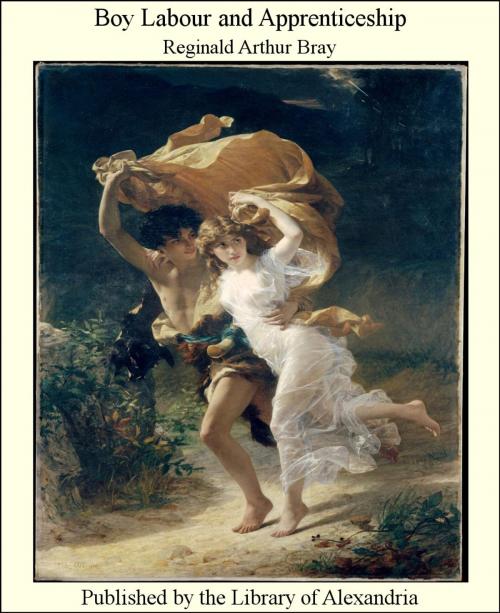Boy Labour and Apprenticeship
Nonfiction, Religion & Spirituality, New Age, History, Fiction & Literature| Author: | Reginald Arthur Bray | ISBN: | 9781465524881 |
| Publisher: | Library of Alexandria | Publication: | March 8, 2015 |
| Imprint: | Language: | English |
| Author: | Reginald Arthur Bray |
| ISBN: | 9781465524881 |
| Publisher: | Library of Alexandria |
| Publication: | March 8, 2015 |
| Imprint: | |
| Language: | English |
We are beginning to realize clearly that all is not well with the youth of this country. From all sides complaints of neglect, and the evils of neglect, are thronging in. Boys as they leave school are casting off the shackles of parental control, and, with no intervening period of youth, are assuming the full independence of the adult. The old apprenticeship system is falling into disuse, and methods of industrial training are at once unsatisfactory and, for the majority, difficult to obtain. Boys in increasing numbers are entering occupations where they learn nothing and forget all they have previously learned, and in which they can see no prospects of employment when manhood is reached. As a consequence, there is a general drift into the army of unskilled labour, and later into the ranks of the unemployed. All expert opinion is unanimous in voicing these complaints. The Report of the Poor Law Commission, Majority and Minority alike, with its volumes of special inquiries and evidence, is one long testimony to the gravity of the evils which are the consequence of neglected youth. Further, we are coming to understand that the period of adolescence forms a critical epoch in the development of the lad. “The forces of sin and those of virtue never struggle so hotly for possession of the youthful soul.”[1] And the boy too often is left to fight out this struggle without assistance, and even without advice. The conditions of modern life are increasingly hard on youth. “Never has youth,” says Mr. Stanley Hall, the greatest living authority on adolescence, “been exposed to such dangers of both perversion and arrest as in our land and day. Increasing urban life, with its temptations, prematurities, sedentary occupations, and passive stimuli, just when an active objective life is most needed; early emancipation and a lessening sense for both duty and discipline; the haste to know and do all befitting man’s estate before its time; the mad rush for sudden wealth, and the reckless fashions set by its gilded youth——” all in increasing degree imperil the passage to manhood. And, lastly, we are compelled to confess that an evil which is at once a grave and a growing evil is one which demands immediate attention. It is not a problem that can be laid on the shelf for that convenient season which never arrives, when legislators have nothing else to think about. There is urgent need for reform in the near future, unless we would see a Further degeneration of the youth of the country. The object of this volume is altogether practical—to show what reforms are necessary to prevent the growth of the evil by laying the foundation of a new and true apprenticeship system. But to achieve this object it is necessary first to explain how the problem was dealt with in days gone by, when life was more stable and industrial conditions less complex; and, secondly, to understand in detail the characteristic features of the question as it presents itself to-day. Only with the experience of the past and the present to guide us can we face the future with any hope of controlling its destinies
We are beginning to realize clearly that all is not well with the youth of this country. From all sides complaints of neglect, and the evils of neglect, are thronging in. Boys as they leave school are casting off the shackles of parental control, and, with no intervening period of youth, are assuming the full independence of the adult. The old apprenticeship system is falling into disuse, and methods of industrial training are at once unsatisfactory and, for the majority, difficult to obtain. Boys in increasing numbers are entering occupations where they learn nothing and forget all they have previously learned, and in which they can see no prospects of employment when manhood is reached. As a consequence, there is a general drift into the army of unskilled labour, and later into the ranks of the unemployed. All expert opinion is unanimous in voicing these complaints. The Report of the Poor Law Commission, Majority and Minority alike, with its volumes of special inquiries and evidence, is one long testimony to the gravity of the evils which are the consequence of neglected youth. Further, we are coming to understand that the period of adolescence forms a critical epoch in the development of the lad. “The forces of sin and those of virtue never struggle so hotly for possession of the youthful soul.”[1] And the boy too often is left to fight out this struggle without assistance, and even without advice. The conditions of modern life are increasingly hard on youth. “Never has youth,” says Mr. Stanley Hall, the greatest living authority on adolescence, “been exposed to such dangers of both perversion and arrest as in our land and day. Increasing urban life, with its temptations, prematurities, sedentary occupations, and passive stimuli, just when an active objective life is most needed; early emancipation and a lessening sense for both duty and discipline; the haste to know and do all befitting man’s estate before its time; the mad rush for sudden wealth, and the reckless fashions set by its gilded youth——” all in increasing degree imperil the passage to manhood. And, lastly, we are compelled to confess that an evil which is at once a grave and a growing evil is one which demands immediate attention. It is not a problem that can be laid on the shelf for that convenient season which never arrives, when legislators have nothing else to think about. There is urgent need for reform in the near future, unless we would see a Further degeneration of the youth of the country. The object of this volume is altogether practical—to show what reforms are necessary to prevent the growth of the evil by laying the foundation of a new and true apprenticeship system. But to achieve this object it is necessary first to explain how the problem was dealt with in days gone by, when life was more stable and industrial conditions less complex; and, secondly, to understand in detail the characteristic features of the question as it presents itself to-day. Only with the experience of the past and the present to guide us can we face the future with any hope of controlling its destinies















